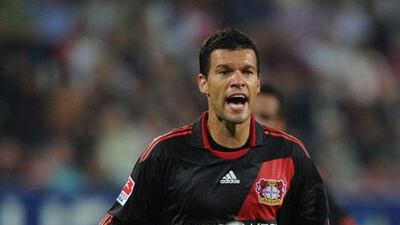Michael Ballack has been kept on tenterhooks about his role tonight in the most resonant of fixtures for the German.
Back to Chelsea, where he spent four of his peak years, the midfielder is anxious to line up from the start of Bayer Leverkusen's tough welcome back to the Champions League.
Not to make the initial XI would act as a reminder of how his fortunes have dipped since he was winning titles and admiration in England.
Ballack turns 35 later this month, and has yet to play a full 90 minutes in this, the second season of his second spell at Leverkusen, whom he rejoined from Chelsea in the summer of 2010.
Rewind 15 months to that time, and Ballack was many things: the greatest German footballer of the 21st century; the captain of Germany, who would finish third, with a thrilling young team, at the World Cup. He had the status of superstar, bearer of high hopes at a Leverkusen who last knew Ballack as the inspiring figure behind their most successful European campaign, finalists in the 2002 Champions League.
When he left Chelsea for Leverkusen, Ballack was also injured, his ankle badly damaged from a challenge by Kevin-Prince Boateng, then of Portsmouth, in the FA Cup final. He subsequently missed the World Cup, where Germany would miss Ballack less than had been anticipated.
He could have been forgiven for detecting that in his absence, a leadership coup was being plotted, not least when Philipp Lahm, who took over as the captain, declared bluntly he wanted to retain the armband. Lahm has it still.
Nor will Ballack wear the Germany jersey again. He is stuck on 98 caps and has been told by Joachim Loew, the national coach, that, apart from a possible tribute appearance in a friendly - a gesture Ballack rejected - he will not be adding to those.
That hurts Ballack still, as he told the English newspaper The Times last week. In truth, Ballack's form and fitness with Leverkusen, even when he had begun to recover from the ankle injury, scarcely demanded an international recall.
He started only 14 Bundesliga and Europa League matches last season and, this last summer, felt open to the idea of moving elsewhere.
Leverkusen, who finished second in the German top-flight, took on a new head coach, Robin Dutt, who seemed to be designing a game-plan which cast Ballack as an occasional option, not as a centrepiece.
"I can't see Ballack and Simon Rolfes both in the midfield, it wouldn't work," said Dutt in August. Rolfes is Leverkusen's captain and very much an active member of the Germany squad.
So far, so gloomy.
Until the weekend, Ballack looked set to begin the latest of his Champions League adventures on the margins, brooding over his long history in the competition, a long list of what might have beens. As a 22 year old, he reached the competition's quarter-finals, while with Kaiserslautern; at Leverkusen, he finished a runner-up. At Bayern Munich he was regularly in the knockout stages.
With Chelsea he played in a final, the one the London club lost on penalties against Manchester United, an outcome that confirmed the unfortunate caricature of Ballack "The Nearly Man" Germans sometimes portray.
His record of silver medals in major international tournaments - the 2002 World Cup, the 2008 European championship; the 2002 and 2008 Champions Leagues - is substantial.
His gold medals are limited to domestic football, a Premier League with Chelsea and Bundesliga titles with Kaiserslautern and three times with Bayern.
But a declining Ballack may not be the figure presented tonight. He has been given encouragement of a bigger role than he might have expected, judging from Dutt's latest thinking. Ballack and Rolfes lined up together from the start in Leverkusen's 4-1 win at Augsburg on Friday night. "I was very pleased with Michael," said the head coach.
Dutt will be aware that, whether Ballack's name is among the 11 first read out over the loud speaker at Stamford Bridge or among the next eight, it will be greeted by the loudest cheer of any of the visitors.


